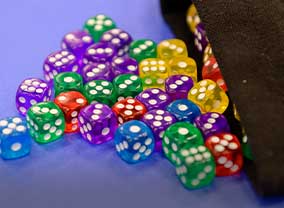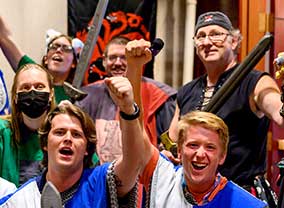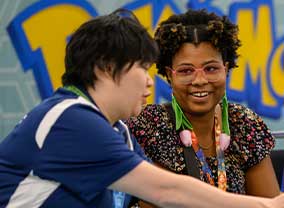Tips for New EOs and GMs
Welcome, New Game Masters and Event Organizers
Interested in running a game or hosting an event at Gen Con, but not sure where to begin? You've come to the right place! This handy guide will get you started. Please note that while this information is useful for those new to hosting events for Gen Con, it is geared primarily to running events for the Gen Con in-person convention hosted in Indianapolis, Indiana.
If you have any questions, shoot us an email or visit our forums. Make sure to sign up for the EO/GM mailing list to receive announcements and important information.
For all Trade Day inquiries, event questions, actions, etc., please contact
[email protected]
directly.
Overview
Anyone can run events at Gen Con. You do not need to pay for event space.
Instead, your players will usually be required to purchase a ticket to your event. The price starts at $2 for every two hours, though some events (like seminars) are free. You can charge more if you want to try to make some money from your event, and you only need to pay for space if you want to run free games or demos.
Every event must be submitted using our online system. We will review it, approve it, and/or send it back for correction, and then give it a location. You are required to turn in tickets to track attendance.
That's it, in most cases. Things can get more complicated depending on the nature of the event, but that's how the basic process.
Why Run Events?
Whether you are a company, a gaming group, or an independent GM, there are two broad reasons to run games at Gen Con:
- To expose new potential players to the game.
- To support existing players.
There is no better way to get people excited about a good game than to let them play and experience it for themselves.
For companies, running events allows you to expose more attendees to your game (they see it when browsing events, walking around the convention, etc.) and to have a place to send interested attendees for more information, so you can keep your booth focused on sales and short demos. Having a schedule of events at your booth allows you to hand over a flyer with some additional information about the game along with an invitation to try the game out during your scheduled events. Events also provide a substantive way to engage with the community established around your games. Even a single event can help make a convention special for your fans, both new and old.
For gaming groups and independent GMs, events are how you share a game you love with your fellow attendees, and hopefully convert some of them to new fans. It’s also a great way to guarantee that you have a chance to play a game you love at Gen Con, especially if you don’t often get to at home.
For everyone, running games can get you free badges to attend the convention, and independent GMs and gaming groups can earn hotel reimbursement. For full details on badges and hotels, refer to the Event Host Policy.
Your Responsibilities
You must read the Event Host Policy.
This document explains just about all the rules and regulations you need to be aware of in order to run events at Gen Con.
Not every policies applies to every event, but it is important to read through the full document. If you have any questions or are confused at all after familiarizing yourself with it, just drop us an email and we'll be happy to walk you through it.
You (and only you) are responsible for your events.
We are here to help and want to make your event dreams come true, but it's up to you to make sure that your event is accurate and correct, and you are expected to check up on your event throughout the year to make sure everything is good, confirm your location, etc.
At the very least, you should check your event after submitting it, before event registration begins, and before the convention as one final check.
If you have any questions at all, email us or visit the GM forum. If you don't get a response in a timely manner, try again or call us directly to follow up.
Don't assume that we got your message or that things are just going slowly. It's better to follow up than to have something slip through the cracks.
Make sure to sign up for the EO/GM mailing list to receive announcements and important information.
Your Event Plan — Scheduling Focused Events
The first thing you need to do is just sit down and think about your event.
- What is it that you want to do?
- How many people are you confident will show up?
- What do you need to run the event (e.g. space, supplies, etc.)?
If you are going to run multiple events, you need to review the schedule as a whole to balance your available staff. Some more things to consider:
- It’s hard to support all games in every time slot, and over-scheduling the same type of game can lead to poor turnout. Instead of running four different games for four players every two hours, consider rotating through the games over the course of the day, running a different event for 16 players spread across multiple copies. This focuses players and event staff, and minimizes the disruption of players that sign up but don’t show up.
- Avoid big spikes whenever possible. Try not to schedule a single huge tournament and nothing else the rest of the weekend. Consider running multiple smaller tournaments or balancing different large tournaments (whether for different games or different formats). Event space that will be consistently used throughout the whole convention is easier to reserve than big spikes that would otherwise remain empty.
- If you don’t have an established player base at the convention, start small. Even if your game has been doing very well, start conservatively. Begin with a few modest events, then once those fill up you can submit more or return the next year with three dedicated tables, for example. Once those fill, you can grow to six tables, and when those are full, we can keep looking at expansion. It is better to be full and busy than half-empty.
- 9 am to 8 pm is generally “prime time” for events, but think about the
kind of events you want run when deciding on operating hours.
- The exhibit hall is open 10 am – 6 pm (4 pm on Sunday), so that is when most attendees will be at the convention, but traffic will ebb and flow around those times.
- Many attendees will line up for the exhibit hall opening at 10 am, so starting your events at 9 am may get some additional traffic, particularly if they are shorter games.
- When the exhibit hall closes at 6 pm, there will be a wave of traffic in many areas as attendees exit, often on the way to dinner. Short games that can be played while waiting for friends to meet up are a great fit for this time of day.
- Lots of attendees are still looking or something to do through 10 pm or midnight, so evening time slots can be good for longer, more in-depth, and focused games.
- In summary, accessible introductory games will see success from 9 am to 7 pm, and in-depth games work well in the evenings. Special events (tournaments, previews, exclusives) can be scheduled at almost any time that fits into your staffing schedule.
Submitting Your Event — Getting the Details Right
Once you've got an idea fleshed out for the event you want to run, you'll need to submit it for review. More information on event submission (important dates, links to the form, etc.) can be found on the EO/GM page.
- Your event listing is often your only chance to attract players, so be as exciting and dynamic as possible. Typing in all caps or using lots of exclamation points does not make something exciting.
- Your title and description should be clear and concise, giving
potential players a hook to attract their attention and a reasonable
description of what to expect. Minimize duplicating information
found in any other fields (such as the title, description, game system,
and/or rules edition, all of which are separate fields).
- Don't just repeat the name of the game in the description. Instead, explain what is interesting or unique about this game or event.
- Avoid putting the name of the game in the event title, particularly for RPGs and LARPs. Give the event an actual name, if possible. RPGs and LARPs should use the adventure or scenario name, the game name is only permitted in story or improv games where the players determine what will be played.
- You can add an optional long description if you need more space, but it will always be displayed with the short description, so you don't need to repeat yourself.
- Game system should normally be the name of the game, unless it is an entry in a series or explicit family of games. It is never a game mechanic, nor is the game system and the rules edition the same. Do not include “edition” in the rules edition field, and use “3rd” or “5th" instead of “third” or “fifth.” If your game is new and only has a single edition, then it’s the "1st" edition. “New” or “current” are not valid rules editions, as they are relative to the player’s knowledge and not absolute. Use a specific designation instead, or possibly a date of last update, for living rules updates.
- The message to registered players is your one and only chance to send further instructions to players (character creation details, for example) and it is emailed once they buy a ticket, so phrase it appropriately.
- "N/A” or “none” is never a valid entry for a required field, nor should information be repeated between fields. Every game has an edition; if nothing else, it’s the "1st".
- If you need anything special for this event in particular, note it under special requests. Requests affecting multiple events (such as special space or layout) needs to also be emailed to [email protected]. “Please keep all my events near each other” is not a special request — we attempt to do that by default.
Once you have filled out your event details, we will review your event, find a location for it, and change it to Active status so everyone can see it when event registration begins.
You should get an email notification whenever your event is changed or approved, but just in case you should make sure to check back on your EO/GM Dashboard regularly to confirm its status.
Gen Con may need to make changes to your event when we review and/or place it. Usually these edits are for the sake of clarity. We may also cut down on the maximum number of players or change the time you requested. This is usually because we simply don't have enough space for you, or because we have historical data that suggests lower attendance for that type of event than you might expect.
If you ever have any questions or dispute any change to your event, just let us know. We're more than happy to go over it with you. Maybe you have better data than we do, or we misunderstood what you were trying to say. We're not always 100% right.
Running Your Event — Having a Good Time
When you run your event, remember three things:
- The local event HQ is there to make your job easier. Check in with them to let them know that you're there and are ready to run (in case any players show up asking about your game) and let them know if you have any problems. If someone is at your table or you can't find your space, don't worry about solving it yourself, and don't just move your game to another table. Check in with the HQ and let them handle it.
- Collect tickets from all your players. It is very important that you turn your tickets in after your event (even if it was free), and you should get tickets from everyone, if applicable. If your event has a cost, accepting tickets from some players but not others just isn't fair, and you don't get credit for them anyway. Don't forget that everyone at the table (including you!) needs to have a valid badge. No one wants to have to stop your game to check.
- Run your event as submitted. That means running with the rules, setting, scenario, location, time, etc. as described. If your players are willing, you can make some adjustments, but they probably signed up for your game because they wanted to play what you actually listed and changing it too dramatically can very easily frustrate your players and ruin their fun. Don't change anything without their OK.
Event Messaging Tool
Three weeks before the convention, the Event Messaging Tool will be
enabled on the Event Details page for Gen Con events. Only the EO,
GMs and registered players for your event will have access to the tool, and it
may be used for any last minute coordination or communication between you and
your players.
The "Message to Registered Players" from your event submission will be
pinned as the first post in the Event Messaging Tool for that event. Any posts
made by an EO or GM will send out an email notification to the ticket holders.
Be sure to monitor the messaging tool periodically to review any messages from
players.
The Aftermath — Wrapping Up
After your game, make sure to turn your tickets in.
You can get envelopes from GM HQ or any event HQ, and you just need to fill out some basic information about your event (most importantly the game ID and number of tickets). Even if you aren't asking to be paid for your players, your tickets are proof that your event happened, and serve as your attendance record. If you don't turn in your tickets, then you don't get credit toward badge or hotel reimbursement, and next year we might not be able to find you space if we don't know how many people played. Tickets are very important; they are the primary factor in how space is assigned in future years.
If you qualify for badge and/or hotel reimbursement (see the Event Host Policy for details), you also need to send an email to [email protected] to specifically ask for reimbursement. Make sure to include your name and a list of the events that you ran, so we can check on their tickets.
And that's it, now you can start planning your events and get the jump on submission and location assignment!





